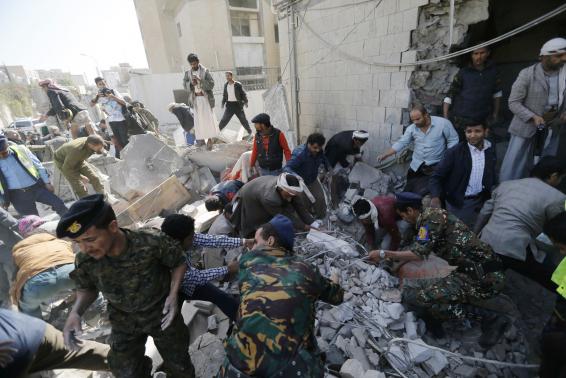 An Al-Qaeda terrorist drove a car laden with explosives at the Iranian ambassador's residence in the Yemeni capital Sanaa on Wednesday, security officials said, killing three people.
An Al-Qaeda terrorist drove a car laden with explosives at the Iranian ambassador's residence in the Yemeni capital Sanaa on Wednesday, security officials said, killing three people.
Iran's ambassador to Yemen, Hussein Niknam, was not at home when the bomb exploded at the residence in this Yemeni capital.
The attack, the second such bombing in the capital in as many months, blew a large hole in the Iranian residence and sent rubble flying across the street of the well-guarded diplomatic quarter of the city.
A medical official said a Yemeni civilian and two soldiers were killed. Seventeen people, mostly employees from a nearby oil ministry building, were wounded.
Iran's Deputy Foreign Minister Hussein Ami-Abdollahian told the Tasnim news agency that the ambassador was unharmed.
"The Sanaa explosion didn't harm any Iranian diplomats. Only material damage was inflicted," Tasnim quoted Amir-Abdollahian as saying.
Niknam is new to the post and only presented his credentials to the Yemeni foreign ministry within the last week.
Amir-Abdollahian told the official news agency IRNA that Tehran counted on Yemen to "quickly identify and punish the culprits behind the terrorist act".
"Glass shattered on me from the force of the explosion," Bashir al-Ossaimy, who works at a drug company opposite the residence, told Reuters. He had two bandages on his face, a swollen eye and bloodstained jacket and shirt.
Al-Qaeda in the Arabian Peninsula, Yemen's local branch of the terror group, later issued a statement on Twitter claiming the attack on the ambassador's house, located next to the headquarters of Yemen's main intelligence agency. The group has carried out similar attacks in Sanaa.
AQAP claimed responsibility for a bombing in Sanaa on Oct. 9 when a terrorist blew himself up at a Houthi checkpoint, killing 47 people.
The car bombing comes after Houthis who are Shia Muslims captured the capital in September, routing fighters loyal to the Islah party and its tribal allies.
Local Al-Qaeda militants have been battling Houthis in the central region where the group and its allies aim to root out Takfiri terrorists.
Washington views Al-Qaeda in the Arabian Peninsula as the most dangerous branch of the terror group as it has been linked to a number of foiled or botched attacks on the U.S. homeland. The U.S. has conducted a campaign of drone strikes in the country targeting suspected militants and offers aid to the country's military. Civilian casualties in the strikes have angered many.
Iranian diplomats have been targeted in Yemen before. One diplomat is being held hostage by militants and another was killed this year when he resisted a kidnapping attempt.
